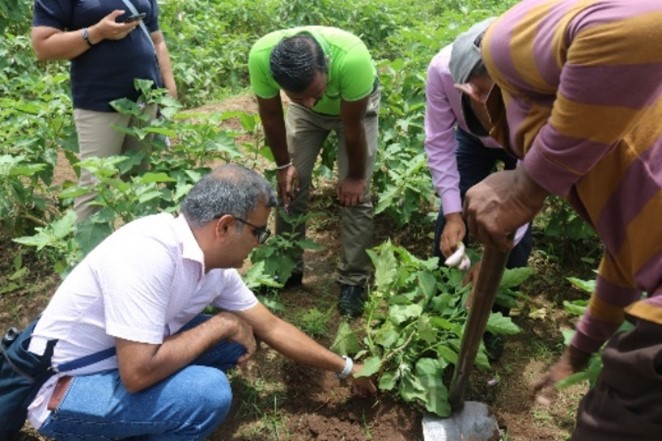
Projects & Activities
Capacity building of Extension and Advisory Services (EAS) in Sri Lanka and adaption of ‘New Extensionists’ approach of GFRAS
The Global Forum for Rural Advisory Services (GFRAS) has developed a series of training modules (New Extensionist Learning Kit) that can be used to develop the competencies of extension workers to enable them to become ‘New Extensionists’. The Network of Agricultural Extension and Advisory Service in Sri Lanka (NAEASSL) having realized the need to translate the training modules formed a committee of experienced extension professionals and joined hands with the Coconut Cultivation Board to translate NELK modules into Sinhala language and adapt the same to suit local extension services. Although the document focuses mainly on extension in the agricultural sector, it is important to remember that many of the practices discussed in this module are relevant to EAS in other sectors as well. The initial Sinhala translation was done by Dr. Jayantha Atapattu who deserves special recognition. All members of the editorial panel contributed voluntarily to adapt the Sinhala translations suitable for local extensionists.” The whole project was coordinated by Mr. W.M. Ratnayake and supported by Mr. W.A.S. Senaratne of Coconut Cultivation Board.
Module 1: Introduction to the new extensionist – Prof. Padmasiri Wanigasundera, Dr. Ashoka Seneviratne
Module 2: Extension approaches and tools – Dr. B. A. D. Samansiri, Prof. Mahinda Wijeratne
Module 3: Agricultural extension program management – Prof. Padmasiri Wanigasundera, Dr. B. A. D. Samansiri
Module 4: Professional Ethics – Mr. Ranila Tharaka Jayasinghe, Dr.Lalith Amaratunga, W.A.S. Senaratne
Module 5: Adult learning for behavioral change – Prof. Padmasiri Wanigasundera, Ms. Kamali Dadigama
Module 11: Agricultural entrepreneurship – Prof. Mahinda Wijeratne, Mr. Ranila Tharaka Jayasinghe, Dr. Ashoka Seneviratne
It has been widely accepted that Private Extension Service Providers (PESPs) are a crucial partner to meet the needs of the targeted beneficiaries, and to identify technologies that need to be promoted. They must be supported to develop their professionalism so that they could become effective sustainable service providers for smallholder farmers.
The extension needs of the farming community is becoming highly complex with the escalating trends such as climate change and advances of technologies. The farmer leaders as agro-entrepreneurs are also becoming a powerful grassroot service provider. Strong producer organizations are required to develop inclusive governance mechanisms to negotiate and implement fair public-private partnerships. Therefore, the NAEASSL has an important role to build capacities of PESPs, grass-root service providers and leaders of producer organizations. The Network is having an unparallel human resource base who could mobilize the potentials of extension and advisory services of all sectors.
ADB Project on Building Capacity for Climate Resilience and Organic Farming among Vegetable and Fruit Growers in Sri Lanka (with John Keells Holdings Plc.)
Background and Objective:
The NAE has been selected as the implementing partner of a ADB equity investment in John Keells Holdings Pl., a leading conglomerate operating in transportation, consumer foods, food retail, leisure, property, financial services, and other sectors in Sri Lanka. The equity investment envisages to support the company’s expansion of its food manufacturing and food retail and distribution capacities, enabling greater access to quality produce, generating local employment, and supporting the local economy. The project will also support smallholder farmers from whom the company directly sources fruits and vegetables for its food retail operations.
The main objectives of the project:
- to train at least 2,000 vegetable and fruit farmers (at least 30% female) in climate-resilient vegetable and fruit farming best practices adapted to the needs of women and the local context;
- to train at least 2,000 vegetable and fruit farmers (at least 30% female) in functional financial literacy, including farm budget management and access to credit and savings and a module on the economics of climate-resilient capital investments; and
- to develop at least four (4) demonstration farms in different agriclimates across Sri Lanka in order to demonstrate effective climate-resilient farming methods in each context and to facilitate climate-resilient farming trainings for vegetable and fruit farmers.
This project seeks to increase the capacity and empowerment of women and incentivize their involvement in the vegetable and fruit sector in Sri Lanka.
Development of the training would comprise a combination of classroom-based teaching as well as hands-on training, including on-farm, and would be supported by the provision of online training modules and information. ADB strongly encourages a design that promotes farmer to farmer knowledge sharing. Also, delivery of the trainings should be suited for participants with basic level of literacy. The firm will report to the ADB project officer through the assignment team leader and will perform.
Participants will be farmer-members from which the company purchases vegetables or fruit. Trainees will be selected based on their experience with agricultural work, basic level of literacy, basic level of physical abilities, be over the age of 18 years, and be involved in vegetable or fruit farming. To maximize development impact for the TA, the consultant shall work with the company’s staff for selection of candidates where the company operates.
